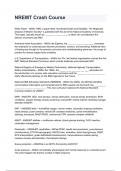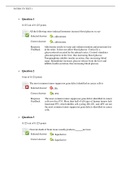NREMT Crash Course
White Paper - ANSIn 1966, a paper titled "Accidental Death and Disability: The Neglected
Disease of Modern Society" is published with the aid of the National Academy of Sciences.
This paper, typically known as ________ __________ is taken into consideration the
delivery of present day EMS
American Heart Association - ANSIn the Eighties, the ______ ______ ________ increases
the emphasis on cardiovascular disorder prevention, science, and schooling. Additional tiers
of training are brought to the present curriculum and notwithstanding advances, the scope of
practice for diverse stages lacks solidarity.
U.S. Department of Transportation - ANSIn the 70s, this federal organisation evolved the first
EMT National Standard Curriculum which include textbooks and paramedic NSC
National Registry of Emergency Medical Technicians; National Highway Transportation
Safety Administration - ANSIn the 1990s, the _____ ____ ___ ___ ___ ___ advocates for
the introduction of a country wide education curriculum and the _______ ___ ____ ___ ___
starts offevolved paintings on the EMS Agenda for the Future
National EMS Education Standards (NEMSES) - ANSIn the 2000s, the NHTSA identifies
commonplace information and competencies for EMS experts via the brand new _________
________ ______ __________. This new curriculum replaces the National Standard
Curricula created via USDOT.
EMR - ANSCPR, AED, Oral airways, airway obstruction, manual airway techniques, BVM
ventilation, oxygen therapy, airway suctioning, manual BP, vehicle injector, bleeding manage,
assisted childbirth
EMT - ANSEMR skills + humidified oxygen, venturi masks, automatic shipping ventilators,
nasal airways, pulse oximetry, vehicle BP, assisted medicines, spinal immobilization,
splinting, tourniquet, MAST/PASG, mechanical CPR, assisted complex childbirth
AEMT - ANSEMT abilities + multilumen airlines, blood glucose tracking, IV/IO insertion,
medication management
Paramedic - ANSAEMT capabilities + BiPap/CPAP, needle decompression, percutaneous
cricothyrotomy, ETCO2/capnography, NG/OG tube, intubation, direct laryngoscopy, PEEP,
ECG interpretation, guide defibrillation/cardioversion, transcutaneous outside pacing,
massive remedy administration, thrombolytic therapy
Scene protection - ANSWhat is an EMT's first priority ALWAYS?
Acute pressure - ANSan immediately physiological and mental response to a selected event.
The event triggers the frame's combat or flight response
,Delayed strain - ANSa strain reaction that develops after the worrying event. It does not
intervene with the EMT's ability to perform throughout the demanding occasion.
Posttraumatic strain disease (PTSD) is an instance of ________ _______
Cumulative stress - ANSthe end result of publicity to annoying situations over a extended
period of time. This leads to burnout for many EMTs.
Critical Incident Stress Management (CISM) - ANSis a formalized process to help
emergency people cope with pressure
- diffusing sessions are held within 4 hours of the incident
- debriefing classes are held 24 to 72 hours after the incident
Occupational Safety and Health Administration - ANSoversees rules regarding
administrative center safety, including infectious disease precautions
Minimum PPE - ANSGloves and eye safety should be used in the course of any patient
touch scenario and are examples of...
Expanded PPE - ANSThe use of disposable gown and mask for sizeable contact with frame
fluids. Use a high-performance particulate air (HEPA) mask or a N-95 respirator for
suspected airborne disease publicity, consisting of tuberculosis
no longer enter; emergency care - ANSUnless cleared by using a hazmat specialist, an EMT
is expected to _____ ______ and no longer begin _______ ______ till sufferers have been
decontaminated or otherwise cleared by using hazmat crews
now not enter; safe distance - ANSWhen it involves crime scenes, EMS providers ought to
____ ______ a criminal offense scene unless regulation enforcement has decided it's far
secure. EMS carriers may be advised to respond to the call however preserve a _____
_______ away till cleared by using law enforcement. This is every so often called "staging
for PD"
exceedingly reflective visitors protection vest - ANSIn extrication conditions, federal law
requires EMS people put on permitted _______ ______ ____ ____ ______ whilst operating
on roadways, around traffic, or at an accident scene
Power raise - ANSA approach of lifting in which one continues the item near the frame, the
usage of the legs to lift and not the returned (legs bent, back immediately). Use a power grip
with arms UP and all hands wrapped around the item.
Urgent move - ANSthe patient has a potentially lifestyles-threatening injury or contamination
and ought to be moved speedy for assessment and delivery
consists of speedy extrication
,Rapid extrication - ANSan urgent move used for patients in a motor vehicle; it calls for a
couple of rescuers and a protracted backboard. The patient is circled onto a backboard with
guide cervical spine precautions and removed from the automobile
Non-pressing movements - ANSused while there aren't any dangers and no life-threatening
situations apparent.
Consists of direct floor lift, extremity raise, direct deliver method, and draw sheet technique
Log roll technique - ANScommonly used to location a patient on a backboard or assess the
posterior, may be done even as keeping guide cervical backbone precautions
need to have as a minimum 3 skilled personnel
Stair-chair - ANSexcellent for staircases, small elevators, etc. Does not allow for guide
cervical backbone protection, CPR, or artificial ventilation
Backboard - ANSused generally for cervical spine immobilization, allows for CPR and
artificial ventilation.
Requires four people
scoop stretcher - ANSallows for clean positioning with minimum patient movement. Precise
for reducing patient pain all through movement
rear - ANSwhen coming near a helicopter, in no way method from the
left - ANSif the affected person is pregnant and desires to be on a backboard, they have to
be placed on the ___ facet
improve directives - ANSwritten instructions, signed by means of the affected person,
specifying the patient's needs regarding treatment and resuscitative efforts
includes DNRs and dwelling wills
attack - ANSa character can be guilty of ______ although every other person handiest
perceived that they supposed to inflict damage. Physical contact is not required to be guilty
of assault.
Battery - ANSphysically touching another person without their consent
negligence - ANSthe maximum common purpose EMS carriers are sued civilly
consists of a breech of 4 core values:
- duty to behave: the EMT had an duty to reply and provide care
- breech of responsibility: the EMT did not determine, treat, or shipping affected person in
keeping with the usual of care.
, - damage: the plaintiff skilled damage or damage diagnosed by way of the legal machine as
worth of repayment
- causation (proximate cause): the harm to the plaintiff become, at least in element, at once
due to the EMT's breech of obligation
gross negligence - ANSexceeds simple negligence. It involves an indifference to, and
violation of, a legal duty.
- reckless affected person care
- can result in civil or criminal expenses
abandonment - ANSonce care is initiated, EMS carriers cannot terminate care with out the
affected person's consent. This is the termination of care without shifting the patient to an
equal or higher scientific authority
continuity of care; billing; subpoena; crimes - ANSEMTs can launch patient data with out
consent whilst:
1) the statistics is essential for ________ ___ ______
2) the records is essential to facilitate ______ for services
three) the EMT has obtained a legitimate __________
4) reporting possible ________, abuse, assault, overlook, certain accidents, or
communicable illnesses
obvious symptoms of dying - ANSdecomposition, rigor mortis, dependent lividity, and
decapitation are all _________ _______ ____ __________ and mean that resuscitation isn't
important
lifeless on arrival; suicide; attack; abuse; crime - ANSLaw enforcement or the medical expert
have to be notified for situations inclusive of:
1) any scene wherein the patient is ______ ____ _______
2) _______ tries
three) _________ or sexual __________
four) toddler _______ or elder _________
5) suspected ________ scene
6) childbirth
repeater - ANSa type of base station that receives low-electricity transmissions from
transportable or cell radios and rebroadcasts at higher energy to enhance variety
cellular facts computer systems - ANSrelay virtual records in preference to voice
transmissions
can display the cope with of the call and routing facts
allow digital communique with dispatch and different responding devices
lessen the quantity of habitual radio site visitors





